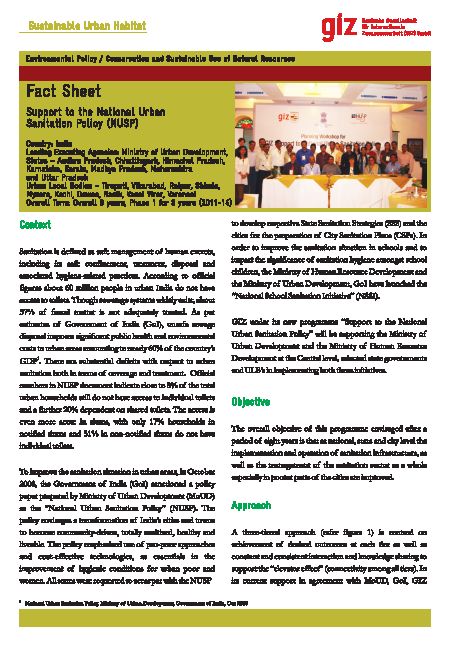Support to the national urban sanitation policy (NUSP) and City Sanitation Plans - Factsheets
GIZ (2012)

Published in: 2012
Publisher:
GIZ India
Author:
GIZ
Uploaded by:
SuSanA secretariat
Partner profile:
Deutsche Gesellschaft für Internationale Zusammenarbeit (GIZ) GmbH
12147 Views
370 Downloads
Content - Summary
Sanitation is defined as safe management of human excreta, including its safe confinement treatment, disposal and associated hygiene-related practices. According to official figures about 60 million people in urban India do not have access to toilets. Though sewerage systems widely exist, about 37% of faecal matter is not adequately treated and as per the estimation of the Government of India (GoI) the economic loss of bad hygienic conditions and environmental damages is about 60% of the total GDP1. There are substantial deficits with respect to urban sanitation, both in terms of coverage and treatment. To improve the sanitation situation in urban areas, in October 2008, the Government of India (GoI) sanctioned a policy paper prepared by Ministry of Urban Development (MoUD) as the “National Urban Sanitation Policy” (NUSP). The overall goal of this policy is to transform urban India into community driven, totally
sanitised, healthy and liveable cities and towns. The policy emphasised on the improvement of hygienic conditions for the urban poor (pro-poor approach)and for women through cost-effective technologies. All states are requested to act at par with the NUSP to develop respective State Sanitation Strategies and the preparation of City Sanitation Plans (CSPs).
GIZ’s Advisory Services in Environment Management Programme (GIZ-ASEM) is supporting the Municipal Corporations of Shimla, Varanasi, Nashik, Raipur, Kochi and Tirupati in selected interventions under the Jawaharlal
Nehru National Urban Renewal Mission (JNNURM)2 through technical cooperation. Upon request from MoUD, GoI and the city governments, GIZ-ASEM has committed to support these Municipal Corporations in the preparation of City Sanitation Plans. In line with the NUSP, the CSP is a
comprehensive document which details out the short, medium and long term plan for the issues related to governance, technical, financial, capacity building, awareness generation and pro poor interventions. The CSP will also identify the key areas where further studies (detailed project report)are required.
The preparation of City Sanitation Plans closely follows the concept as formulated under the NUSP.
Bibliographic information
GIZ (2012). Support to the national urban sanitation policy (NUSP) and City Sanitation Plans - Factsheets. GIZ India
Filter tags
Cities (WG6) East Asia & Pacific English Factsheets and policy briefs Urban (entire city)















